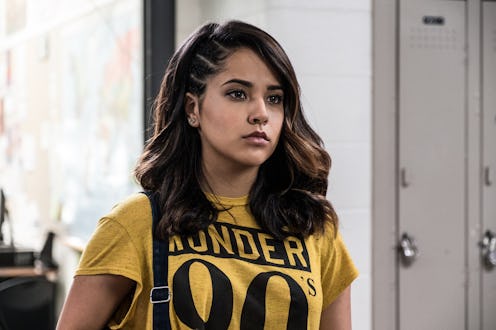
As a '90s kid, the Power Rangers were my first introduction into the superhero world. I had no idea that the Mighty Morphin'Power Rangers, a weird show about rainbow-colored teenagers would be the most diverse on screen superhero team I'd see for the next 20-odd years. As a girl, I was always partial to the female Power Rangers, aka the Pink and Yellow Rangers. Seeing women kick ass has always been a pleasure of mine, which is why I am happy to report that the Power Rangers reboot embraces its female heroes. There's plenty of girl power to go around in the new movie, but there's one awesomely feminist line in the new Power Rangers you have to hear.
There's a moment at the end of Power Rangers when Trini (Becky G.), the Yellow Ranger, is talking to her little brother at home after saving the world. Speaking of the Power Rangers, the little brother says something like, "I wanna be the Yellow Power Ranger." To which Trini replies, "How do you know it's a guy?" BOOM. Drop the mic. Trini's awesome response is packed with so many feminist nuggets, I don't even know where to begin. Let's start with the obvious: with this line Trini (and the Power Rangers film) is calling out audiences' assumptions that all superheroes are men. It's an assumption normalized every passing day in Hollywood, where superhero movies have become insanely popular — that is, as long as they're starring men. In Power Rangers, however, the superhero team would be nothing without the women in the group. If the women weren't there, the Power Rangers would just be three dudes in suits trying to fight aliens.
Most superheroes in pop culture are men, with women often relegated to the role of damsel in distress, girlfriend, or perpetual sidekick (sorry Black Widow). And that's only begun to change recently, with the promise of two major upcoming female-led superhero films — Wonder Woman from DC and Captain Marvel from Marvel. But, it's taken years for powers that be in Hollywood to conclude that female superheroes were actually worth putting in the spotlight. Thankfully, Power Rangers flips the script, putting women are front and center and making them so badass that little boys want to be them.
The Power Rangers franchise has always been known for its diversity, but the shows haven't been without their problems. In the most popular '90s versions of the Power Rangers — The Mighty Morphin Power Rangers — there was traditionally one boy of color and one woman of color. Moreover, the Power Rangers' colors have always been gendered — Yellow and Pink Rangers are women, while Red, Blue, and Black (with the occasional Green and White) are men. The new Power Rangers movie sticks with these traditional roles in casting, but challenges them with this piece of dialogue.
What makes Trini's line so powerfully feminist is that it challenges the notion that young girls and boys have to relate to superheroes of their own gender. Little girls are already used to this idea. The prevalence of male superheroes ensures that girls grow up wanting to be Batman or Superman. Now with Power Rangers, it's good to see that boys are starting to understand that gender doesn't have to stop them from idolizing a superhero. And, hey, I totally identify with Trini's brother. I also want to be the Yellow Power Ranger when I grow up.